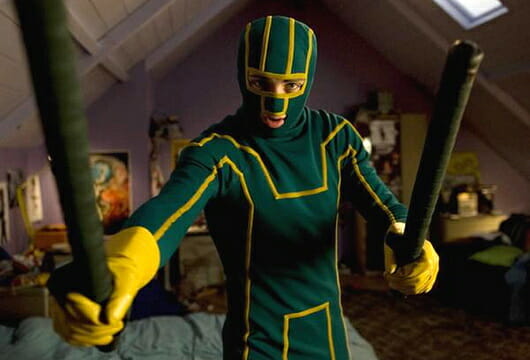Sign up for the
TSL Newsletter
and get $50 off Final Draft 12
By Peter Wertz · April 19, 2010

After Ebert’s less than enthusiastic review of Matthew Vaughn‘s Kick-Ass, I was both anxious and a little nervous to see the film. I like Roger Ebert, and I respect his opinion. It wasn’t luck that brought him to the status of Senior Film Critic in Chief. But I read the books, and I loved them, and I loved them for the things that Ebert found so disturbing. The absurdity and the violence. The pure extremism of this entire scenario, and Mark Millar‘s through line that somehow keeps the thing from going too far. It follows then that I should like the movie, with the two interpretations arriving so near one another, and Millar Executive Producing. But there is a difference. A few in fact, and it’s these differences that, on occasion, distort Kick-Ass the movie from silly entertainment into something dramatic, and intense, and on occasion, not particularly fun to watch.
Dave Lizewski (Aaron Johnson) is one of us: a faceless nobody in particular who longs for something more. Lizewski also happens to be a comic book nerd, and thusly his journey for fame comes in the form of superherodom. He buys a wet suit, and some matching batons, and takes to the streets, only to get his ass severely kicked. This is our first real glimpse of what’s to come in regards to violence, and to put it bluntly, Matthew Vaughn is not fucking around. There are some truly harrowing moments of blood in Kick-Ass and most of them come at the hands of the 11-year-old Hit Girl (Chloe Moretz) and her daddy…Big Daddy (Nicolas Cage). These vigilantes are the real thing, and in Lizewski’s first encounter with the two killers, his reality sets in without compunction. Lizewski is shocked to find tangible consequences to this whole superhero thing. And as Big Daddy and Hit Girl put the blade and bullet to an endless number of mob goons, and make their way towards head boss Frank D’Amico (Mark Strong) for some serious vengeance, Kick-Ass ends up pretty much just following along, far too dazed and confused to do anything other than ride shotgun to the mayhem.
As for the violence, (which, who are we kidding, is what we’re all there to see) this is a more complex issue than simply, “how much is enough?” Ebert’s concern lies in the pure gratuity of it all as well as the baby face pulling the trigger and chucking the knives. He’s not wrong, but I’m not sure he’s entirely right either, because violence isn’t just about violence. It’s about portrayal of violence. The climax of Tarantino’s Inglourious Basterds is proof enough of this, with a reign of death brought down on the heads of some Nazi drones and an audience on the verge of laughter. Whether it’s tension or excitement at the prospect, something in that horrifying imagery is enjoyable to watch, and for the first half of Kick-Ass Vaughn does a fine job of working this same formula. Blood and gore verge on slapstick and the lack of genuine remorse is precisely what keeps the film fun. But something happens around the mid-way point of the movie. Big Daddy, an ex-cop and ex-con, is tracked down by his former partner, who calls quite melodramatically into question his parenting style. There’s certainly an opportunity to turn this into another over-the-top, goofy Nicolas Cage moment, of which their are many, but instead, we find Big Daddy actually defending himself, and the cop alerting us all to problems we thought we didn’t have to worry about. It’s this instant, when the movie jumps abruptly from parody to reality, that the momentum dies. Quite suddenly we’re supposed to be concerned that there’s an 11-year-old girl cutting people’s legs off, and sorry to be the one to bring this up, but what’s fun about that? How are we supposed to enjoy the insanity of this whole situation if morality is suddenly a factor? The same is true for our main character, who in the comic books is basically just a dummy unable to consider repercussions, and in the movies couches his vigilantism not only in this same moronic quest for fame, but also frustrating moral justifications. It’s not just that this steps away from the comics; it’s that by giving the characters some sort of moral impetus, you also inevitably validate the things they’re doing, and frankly, nobody has any business doing that. This violence needs to be outrageous or it won’t work, because if it feels at all realer than a Tom and Jerry cartoon, the audience has no choice but to be offended.
Kick-Ass has a number of really fantastic moments, with an ok script and a number of good performances. In particular, Nicolas Cage and Chloe Moretz steal the show. Moretz shows up out of nowhere playing a female heroine so badass she rivals The Bride from Kill Bill. And Nic Cage, who supposedly channeled Adam West’s Batman for the part is so hysterically good in this movie it has to live in his top five or ten best performances. But despite the source material and all the film’s potential, Kick-Ass‘s second half is too frustrating, too strangely removed from it’s beginning. The film’s abrupt growth of a conscience ends up feeling forced, and though there are still some laugh out loud moments, this is the kind of corner that, once turned, can’t be backtracked. It’s not an easy task taking Millar and John Romita Jr.‘s mayhem and making it palatable for a broader audience, and comic books certainly aren’t expected to have that sort of universal conformance, but recognizing how close Vaughn was to constructing a purely enjoyable blood fest make it all the more frustrating. Missing the mark completely isn’t quite as bad as hitting the target once or twice, then never finding it again.